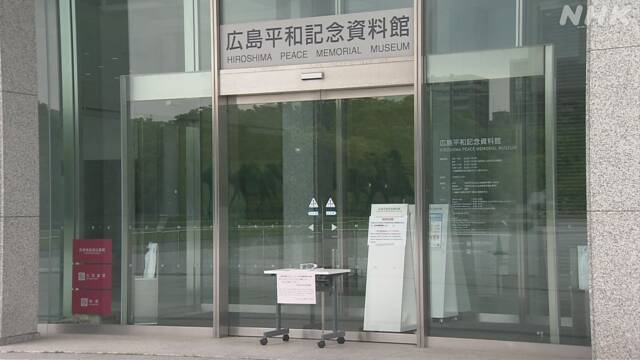90% or more reduction in visitors at the war museum Voice of concern over inheriting war experience August 14 5:48
k10012566141_202008140538_202008140540.mp4
It's been 75 years since the end of the war, and at major museums in various places that convey the memory of the war, due to the influence of the new coronavirus, cancellations and postponement of group reservations have reached at least 700 cases in total since April, and many A NHK study found that the number of visitors to the facility decreased by more than 90% compared to last year. There are voices from the facility concerned that the opportunity to inherit the war experience will be lost.
Closed Cancellation of group reservations or postponement of 740 cases
In order to find out how the new coronavirus affects the entry status of museums that exhibit war-related exhibits, NHK conducted a questionnaire survey from the last month to this month, targeting 10 major facilities throughout Japan. The we.
As a result, there were 740 cancellations or postponements of group reservations from April when the emergency was announced to the end of last month due to the closure of facilities and the suspension of visits.
In addition, the number of visitors during this period decreased by more than 90% compared to the same period last year at 9 facilities with data, of which the Hiroshima Atomic Bomb Museum and the Hiroshima National Peace Memorial Hall for the Atomic Bomb Victims, and Nagasaki The atomic bomb museum has decreased by more than 95%.
There are voices of concern from each facility that, in addition to the operational impact of reduced income such as entrance fees, the opportunity to inherit the war experience through school extracurricular learning will be lost.
Efforts to communicate in various ways
In a severe situation where the number of visitors decreases significantly, each facility conveys the memory of the war in various ways while taking measures to prevent infection.
Of these, at the National Peace Memorial Hall for the Atomic Bomb Victims, volunteers read aloud the experiences of the atomic bombings, which had been stopped to prevent infection, and resumed it from the 13th with an acrylic board in a large room.
In addition, at the Tokyo Air Raid and War Disaster Material Center, there are places where online transmission is being introduced, such as the activities of the storytellers of air raid survivors and efforts to distribute the contents of the renewed exhibition on the Internet.
The Himeyuri Peace Memorial Museum in Okinawa is also considering an online lecture, but he said, "Because it is important to communicate directly to the visitors, it can not be done to prevent infection. Is very disappointing."
In addition, the Shokeikan in Chiyoda-ku, Tokyo, points out the problem, "Because personal information of war victims is handled, there are many restrictions on online transmission."
On the other hand, there are some who are worried about the operational impact of the decrease in the number of visitors. Among these, the Himeyuri Peace Memorial Museum said, “Because it operates with admission revenue instead of relying on public funds, it is a big pain. It is said that.

